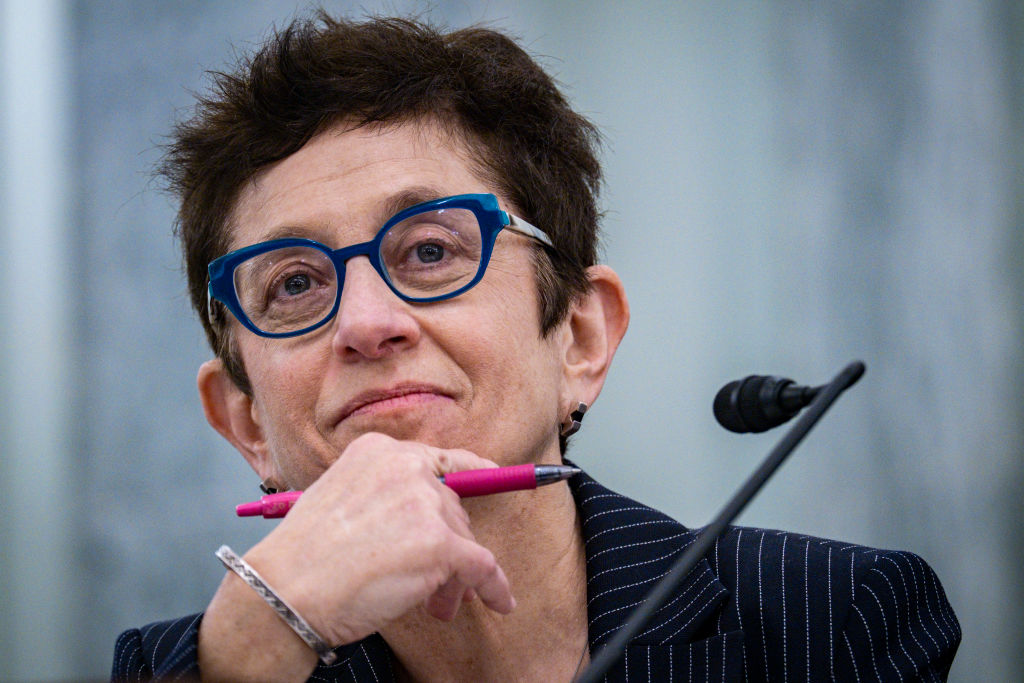Sohn: Dark Money Fueled FCC Nomination Failure
Says media inattention or inaccuracies that she could not correct didn't help

The smarter way to stay on top of the streaming and OTT industry. Sign up below.
You are now subscribed
Your newsletter sign-up was successful
Gigi Sohn has weighed in on the political forces that prevented her from taking a seat on the FCC after her nomination by President Joe Biden and her decades of experience in communications, primarily as a public advocate and briefly as a top FCC adviser. Those forces included dark money groups, she said, with an assist from some inaccurate reporting in the media that she was unable to correct.
As a general rule, given that elections have consequences, presidents have gotten their picks for FCC commissioners approved, even when, also as a general rule, they would not be the choice of the opposing party.
The tenor of her nomination post mortem conversation with the Media and Democracy Project, which backed Sohn's nomination, on June 6 was set from the getgo by host Milo Vee, who billed the online interview as a "case study" of how "giant media companies and dark money sabotaged the FCC and our Democracy."
Also: Preston Padden Says ISPs Are Complicit in Smear of Sohn
Sohn said her treatment in the media was a "humongous" piece of her nomination's failure, a process she said where her hands were tied behind her back while she had the stuffing knocked out of her by dark money and "agenda setting" groups that didn't care what the impact would be on her or her family -- which included being warned to keep her doors locked and "alert the neighbors."
Sohn, who was a fan of the fairness doctrine that required media to seek out both sides of issues of public importance, said that she had allies trying to pitch the mainstream media on a story about the pushback on her nomination but that it was only after she was renominated -- following over a year of inaction by Congress -- that The Washington Post and some others pointed out the "dark money" that was funding that effort.
But before that, she said, "we could not get anybody in the mainstream media to cover this." And Sohn could not speak up or out for herself. "I couldn't say anything," she told Vee. "The White House is, like, 'you're the nominee, you cannot say anything to the press.'"
She said she understands why, but that tied her hands behind her back on several occasions when the press "just printed flat out lies and I couldn't respond." She said that Fox Business wrote that she had told friends that she was sticking with the nomination because the White House had promised to make her chair. She said that was not true but that there was nothing she could do to correct it.
Sohn said The New York Times had reported on her nomination and her withdrawl, but "nothing in between." She gave The Washington Post some credit for its reporting, but only after her renomination and not that made it to the "main page" of the paper.
Sohn had issues with some in the trade press as well, which she said printed a lot of unattributed rumors. And who pays the trade press for the subscriptions, she asked rhetorically: "The companies that were trying to sink me."
Sohn said some folks were doing nice profiles of her now and paying the issue some attention, but added that it would have been nice had there been more reporting "when I was getting the stuffing kicked out of me."
Also: Sohn Supporters Call Out Dithering Dems
Other takeaways from Sohn's conversation, which included advice to activist on strategies:
1. She urged public advocacy groups to reingage in the push to restore network neutrality rules and put in a plug for reimposing broadcast ownership limits, both issues she would clearly have liked to work on with a Democratic majority had her nomination been approved.
2. Don't think of the FCC as the only place to get things done, Sohn said, pointing to a number of activist state attorneys general. Sohn said it was much harder to go "state by state by state," but if they can interest California, New York and Illinois, they could "make some progress."
3. She signaled she did not think that Anna Gomez, who the White House nominated for the third Democratic seat after Sohn bowed out, would have as much pushback, though she did say there was some "friction" already happening around her nomination from people who don't want a "complete" FCC or a functioning goverment. She said that key to Gomez's success would be to get the process moving, citing the delays that helped sink Sohn's own nomination.
Sohn urged her activist audience to press Senate Commerce Committee Chairman Maria Cantwell (D-Wash.) to "hold a hearing without delay and then, as soon as possible, to hold a committee vote and get her [to a vote on the Senate floor]."
The smarter way to stay on top of the streaming and OTT industry. Sign up below.
Contributing editor John Eggerton has been an editor and/or writer on media regulation, legislation and policy for over four decades, including covering the FCC, FTC, Congress, the major media trade associations, and the federal courts. In addition to Multichannel News and Broadcasting + Cable, his work has appeared in Radio World, TV Technology, TV Fax, This Week in Consumer Electronics, Variety and the Encyclopedia Britannica.

